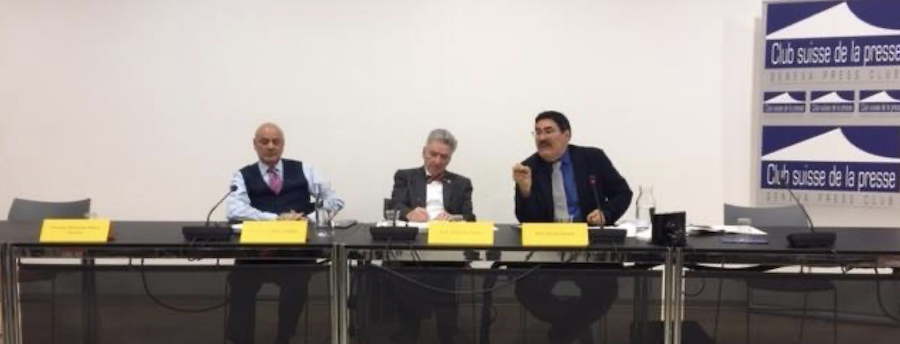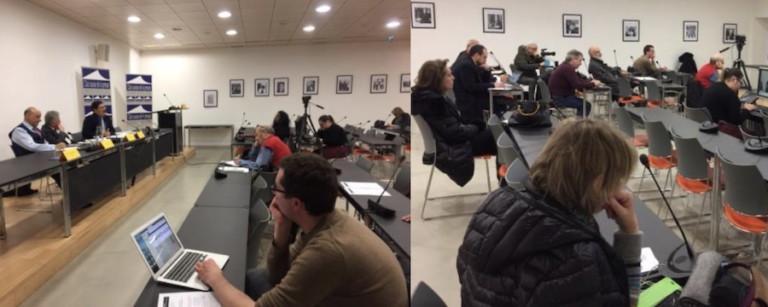
PRESS RELEASE
“United Nations Should use its good offices to mediate and organise, where necessary, self-determination referenda”
“2020 Commission Kashmir launched for realising Kashmiris human rights and right to self-determination”
Geneva: 10 December 2019; Under the patronage of Geneva Press club, Organisation of Kashmir Coalition (OKC), Alaska Indigenous Tribes, OCOPROCE International and International Human Rights Association of American Minorities (IHRAAM), a conference under the title – Worldwide Human Rights Perspectives; was held at the UN Human Rights capital – Geneva.

Professor Alfred de Zayas, (First Independent Expert on the promotion of a democratic and equitable international order and Geneva School of Diplomacy and International Relations), moderated the conference. He reminded the audience that the United Nations Charter is the world constitution and that all UN member states must respect its principles and purposes, notably the promotion of world peace, the right to development and human rights for all without discrimination. He regretted that international law is not applied uniformly, but selectively, applied à la carte
and that human rights have been weaponized, so that instead of advancing human dignity and the entitlement of every human being to civil, cultural, economic, political and social rights, the human rights language has been corrupted and hijacked for purposes of demagogy, demonization and defamation. Professor De Zayas emphasised that one of the Ius cogens rights stipulated in the UN Charter and in Article 1 of the Covenant on Civi and Political Rights is the right of self- determination of peoples; countless wars since world war II have found their origin in the denial of the legitimate aspiration of peoples to determine their own futures, to throw off occupation, colonialism and exploitation; it is not the right of self- determination that generates wars, but the unjust denial thereof. He asked the United Nations must reaffirm, as UNESCO did in 1998, that the realisation of the right of self-determination is an eminent conflict- prevention strategy. This applies, Prof De Zayas, stated to the peoples of Kashmir (who are subjected to gross human rights violation recognised by the Office of the High Commissioner for Human Rights through its two reports of 2018 and 2019) Alaska, Hawaii, West Papua, Rapa Nui, to the Mapuches of Chile, to the Catalans of Spain, to the Corsicans of France. He asked that the United Nations should use its good offices to mediate and resolve grievances and, where necessary, organise self -determination referenda.

Barrister A Majid Tramboo (Executive member of OKC and European Director of IHRAAM) echoed the views of Prof De Zayas reminding about the on going self – determination movement of the people of Indian occupied Jammu and Kashmir where the population, young or old, men or women (including young girls and children), have been targeted to kill. maim, torture, molest or rape. Referring to the legal angle of the Jammu and Kashmir issue under the International Law linking it with the United Nations very specific resolutions on Kashmir, he emphasised that any abrogation of the domestic legal framework by the Indian government does not change the International recognised legal position on the Kashmir issue.
Barrister Tramboo, recalled that since 5 August 2019, Jammu & Kashmir is under blockade meaning cut-off from rest of the world. He expressed deep anguish that the lock – out has caused:
(i) Immense human rights misery: 8 million Kashmiris are imprisoned in their homes by 800000 Indian troops depriving them of right to liberty, food, assembly and expression; arresting and detaining thousands of young Kashmiris across India;
(ii) No health care: Blockade has collapsed health care apparatus altogether there causing deaths particularly relating to pregnant women and due to absence of life-saving drugs such as
(iii) No education: All schools and colleges are closed since 5 August 2019, depriving all Kashmiri school and college going boys and girls of right to education with no examinations in place; and
(iv) Economic blockade; Kashmir’s economy is reliant on its handicraft, agriculture and tourist industry; lock out has cost US chemotherapy and dialyses; $4 billion economic loss to Kashmir resulting in economic chaos
Barrister Tramboo drew the attention on the developing climate change in Kashmir categorising it as below;
– Heat scenario: The impact of climate change in Kashmir is considerable and this is likely to affect particularly irrigated agriculture, horticulture and hydropower capacities; both mean minimum and maximum temperatures shall have drastic affect on Kashmiri lives; one of the primary reasons for this is cutting down of forests and trees by the Indian occupying forces for their use;
– Water flow: The 12 of the last 15 years have been hottest seriously damaging hydropower capacity and that would certainly reduce water flows in the dry season and higher flows during wet season and this is likely to raise further tension between India and Pakistan; and
– The Receding Glaciers: Kashmir’s glaciers are receding at a faster rate compared to other glaciers region in the world; the reason being significantly heavy Indian military deployment with heavy military equipment on the glaciers; melting of glaciers have caused havoc in the valley through floods.
Barrister Tramboo remarked that all this is highly unacceptable and therefore, Kashmir needs aggressive diplomacy and advocacy. He announced that the upcoming year shall be themed as “2020 Commission Kashmir” which will ensure policy making and decision-making advocacy with all the stakeholders particularly the inter-governmental organisations for realising Kashmiris human rights and right to self-determination.
Ambassador Ronald Barnes (Permanent Representative of Alaska Indigenous Tribes) recalled that his name came to light after being appointed and bringing the case to the Sub-Commission on Human Rights, where the Sub-Commission offered a resolution, considering the apartheid in Alaska in light of the violations of Article 73 of the United Nations Charter and this was followed by a visit to Alaska by Professor Alfred de Zayas, during his tenure as the Independent Expert on the promotion of a democratic and equitable international order, where he recommended in paragraph 69 (n) of his 2013 report to the General Assembly that Alaska, Hawaii, Kashmir and other cases be sent to the United Nations Decolonization Committee for re-enlistment to exercise their right of self- determination. Ambassador Ronald Barnes remarked thatthis was followed by the call by Republic of Pakistan during the 2nd cycle Universal Periodic Review of the United States of America to implement paragraph 69 (n) by sending Alaska, Hawaii and the Dakotas to the United Nations Decolonization Committee. Thus Alaska, Hawaii, Kashmir and others are seeking implementation of the recommendations as well as measures to address the many human rights violations associated with the denial of the right of self-determination, Ambassador Ronald Barnes.
In conclusion, Ambassador Barnes brought to light the Pebble Mine issue where mining companies are attempting to create a hole the size of Manhattan in New York to mine of rare earth minerals, diamonds, gold and other raw materials to which Indigenous Peoples are asserting their right and title to Alaska, pointing out that the title to Alaska has yet to be settled since, according to a United Nations report the 1867 Treaty of Cession granted neither title or jurisdiction to the United States of America.
The conference was primarily attended by Journalists together with diplomats and representatives from non-governmental organisations.

